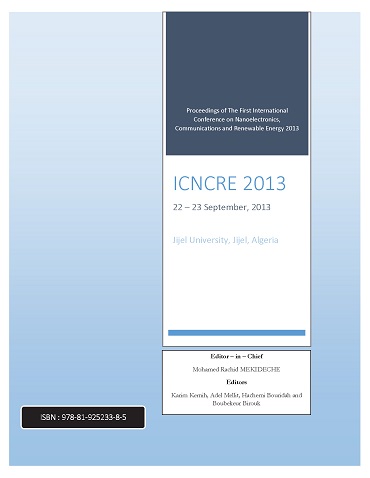- Publication Meta:Value
- Short Title:ICNCRE 2013
- Publisher:ASDF, India
- ISBN 13:978-81-925233-8-5
- ISBN 10:81-925233-8-1
- Language:English
- Type:Hard Bound - Printed Book
- Copyrights:[email protected]
- Editor-in-Chief:Mohamed Rachid Mekideche
- Conference Dates:22 - 23, September 2013
- Venue Country:Jijel, Algeria
- Submitted Papers:477
- Acceptance Rate:21.17%
- Website:www.asdf.org.in
Welcome to ASDF Electronic Digital Library!
ICNCRE 2013
ICNCRE 2013
International Conference on Nanoelectronics, Communications and Renewable Energy 2013
Paper 020
Sizing Method of The Photovoltaic-Electrolyser System for The HCNG Fuel Production: HySolThane Project
Hammou Tebibel1
1Division hydrogene energie renouvelable, Centre de Developpement des Energies Renouvelables, CDER.
Abstract
Transportation sector is the second largest energy consuming sector after the industrial sector with 30% of the world's total delivered energy. Hydrogen (H2) from renewable energy sources is a clean and sustainable option as a fuel and is seen as a potential alternative to gasoline in the future. However, the use of the hydrogen in transportation sector is more known in the fuel cell electric vehicles, where have been widely investigated around the world over the past decades. These vehicles use the hydrogen as an energy carrier to power electric motors through fuel cells. Furthermore, hydrogen as fuel can be used in internal combustion engines in mixture with compressed natural gas (HCNG), which is used as a transition to hydrogen technology.
In this context, the hydrogen enriched natural gas or HCNG fuel production process is presented with the reduction rate of the polluting exhaust gases HC, CO, CO2 and NOx based on the hydrogen fraction in the natural gas. In addition, the current overall natural gas situation in Algeria and the potentialities of hydrogen production is reviewed. A global description of the solar fuel 'Carburant solaire' or HySolThane project is given. Based on a sizing method, simulation results of a typical stand-alone photovoltaic system for electrolytic hydrogen production used in HCNG fuel preparation is showed. These results indicate that the shift to HCNG fuel use is very promising.
Keywords
Author's Profile
Author profile can be generated and linked through our partners World Book of Researchers. To include your profile online Click Here. After it is approved, please email to edlib @ asdf.res.in to create a link with all the papers.
e-AID
ICNCRE.2013.020
Cite this Article as Follows
Hammou Tebibel. Sizing Method of The Photovoltaic-Electrolyser System for The HCNG Fuel Production: HySolThane Project. International Conference on Nanoelectronics, Communications and Renewable Energy 2013. Vol. 1. Chennai: Association of Scientists, Developers and Faculties, 2013. 84-88. Print.
© 2010 - by EDLIB .
All Rights Reserved.

